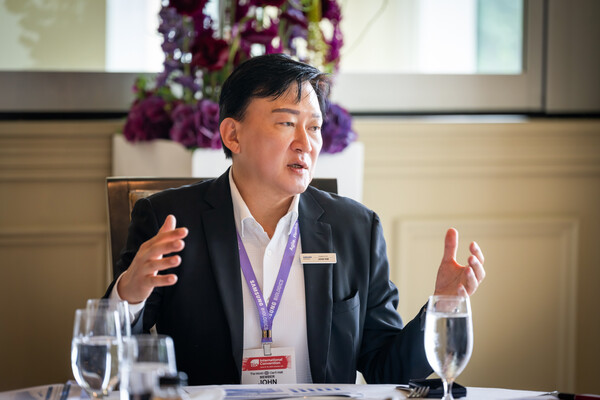BOSTON, Mass. -- By Lee Han-soo / Korea Biomedical Review correspondent -- Samsung Biologics is entering a new chapter as a pure-play CDMO, following a corporate spin-off that separated its biosimilar subsidiary Samsung Bioepis.

CEO John Rim said during an interview with the Korean press at the BIO USA 2025 conference that the move will allow the company to sharpen its focus on its core manufacturing business and further strengthen its global competitiveness.
“With the spin-off complete, we are now fully focused on our CDMO operations,” Rim said. “This enables us to reinforce customer trust by resolving potential conflicts of interest and establishing Samsung Biologics as a fully independent, trusted manufacturing partner.”
Rim explained that some multinational clients had previously expressed concerns over Samsung Biologics and Bioepis operating under the same corporate structure, despite strict internal firewalls. The split now eliminates those concerns and enhances transparency, which Rim believes will lead to stronger, long-term partnerships.
“The separation allows each entity to be properly valued for its unique business model -- CDMO and biosimilars -- and enhances shareholder value by surfacing hidden growth potential,” he said.
Reinforcing growth with 3-pillar CDMO strategy
During the interview, Rim reaffirmed Samsung Biologics’ commitment to its three-pronged growth strategy, which includes production capacity expansion, service portfolio diversification, and global footprint enlargement.
He noted that demand for biologics CDMO services continues to rise steadily, driven not only by label expansion for blockbuster drugs but also by new pipelines in areas like ADCs, Alzheimer’s disease, autoimmune conditions, and oncology.
According to market research firm Frost & Sullivan, the global biologics CDMO market is projected to grow at a compound annual growth rate of 15 percent from 2024 to 2029, reaching $43.9 billion by the end of the forecast period.
“Even though some multinational pharmaceutical companies are expanding their own manufacturing, outsourcing remains the dominant trend,” he said. “CDMOs like us are more vital than ever to meet that need.”
To meet such demands, Samsung Biologics has officially begun operations at its fifth manufacturing plant in April this year.
Located in the newly launched second Bio Campus, the facility adds 180,000 liters to the company's production capacity, bringing the total to 784,000 liters.
Rim especially reiterated that the fifth plant was constructed in just 24 months, which is 11 months faster than its third plant, using advanced techniques such as precast concrete (PC) methods.
Rim emphasized the facility’s heavy adoption of automation, including smart warehousing systems, autonomous mobile robots (AMRs), and digital twin technology for real-time operational optimization.
“Our goal is to complete the second Bio Campus by 2032, which will consist of Plants 5 through 8 and deliver a total capacity of 1.32 million liters,” Rim said. “We are already in positive discussions with major global clients for orders across our plants, including the new facility.”
The company is also exploring further expansion in Songdo, having recently participated in bidding for additional land plots near the company.
Rim said the proximity to existing infrastructure and economies of scale make the site attractive for future investment.
To meet evolving therapeutic demands, Samsung Biologics is also aggressively diversifying its modality offerings.
Rim stressed that the company launched its dedicated antibody-drug conjugate (ADC) facility in March, providing end-to-end support from process development to GMP manufacturing.
“The site supports production from 2 mL to 500 L,” Rim said. “By early 2027, the company plans to add a dedicated ADC drug product line, enabling full in-house service from cell line development to final fill-finish.”
Building on its mRNA and ADC platforms, Samsung Biologics is also developing capabilities in AOCs (antibody-oligonucleotide conjugates) and has completed preparations for adeno-associated virus (AAV) CDO services, including a dedicated development team and lab.
Notably, the company is prioritizing investment in CDO capabilities for AAVs, where most market demand remains in the preclinical and early-phase stages.
Most recently, Samsung Biologics officially launched its organoid drug screening platform, expanding beyond CDMO into the CRO space, on Monday. The new service enables early drug candidate discovery and provides seamless integration into development and manufacturing, increasing client retention and enhancing customer value across the drug development lifecycle.
“Our transformation into a pure-play CDMO not only enhances our global reputation but also accelerates the speed and scope of our strategic partnerships,” Rim said. “We’re focused on delivering value from idea to launch as a truly integrated service provider.”
Related articles
- [BIO USA 2025] KoreaBIO VP warns time is running out for Korea to secure global biotech leadership
- [Photo News] Korean biotech firms take center stage at BIO USA 2025 in Boston
- Korean pharma and biotech firms target global expansion at BIO USA 2025 amid US regulatory shifts
- [BIO USA 2025] Samsung Biologics deepens CRO strategy with organoid-based drug screening and clinical data integration
- [BIO USA 2025] Lotte Biologics accelerates CMO expansion with Ottimo deal
- [BIO USA 2025] Samsung Biologics targets early biotechs with organoid-based CRO push
- [BIO USA 2025] Celltrion advances global expansion with 150+ partnership talks
- [BIO USA 2025] SK biopharmaceuticals CEO highlights physician engagement, epilepsy sales in US
- [BIO USA 2025] Dong-A ST unveils next-gen oncology/immunology pipeline, expands global outreach
- [BIO USA 2025] Alteogen poised to become global SC formulation leader as MSD-led patent battles clear path
- [Reporter’s Notebook] Korea’s regional biotech drive needs focus, not just presence
- [Interview] ABLE Labs seizes Korea's bio law moment with cloud-controlled lab automation
- Cytiva boosts Asia footprint with bioprocessing push and local partnerships
- Samsung Bioepis partners with Harrow for US sales of eye disease biosimilars

